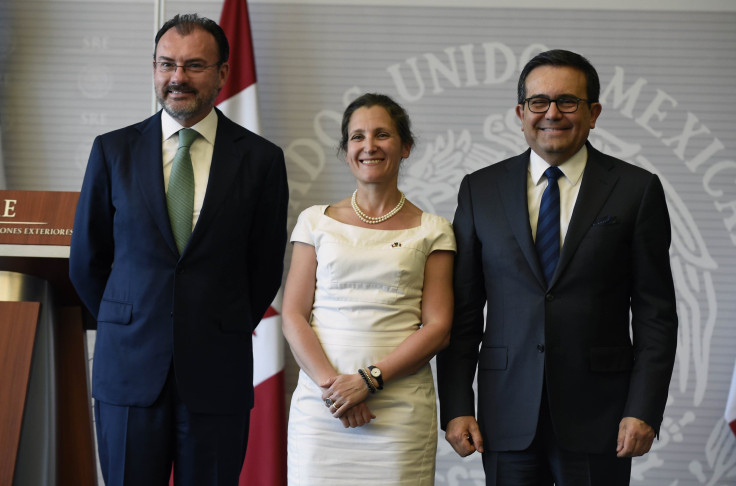US, Canada, Mexico To Hold NAFTA Talks In August: 5 Things To Watch For

After calling the North American Free Trade Agreement (NAFTA) the "worst trade deal ever," due it resulting in economic losses for the U.S., it looks like President Donald Trump has decided to give the agreement another chance. The Trump administration formally told Congress on Thursday it will hold rigorous discussions next month to renegotiate the agreement, reports said.
Trump has made it clear if the talks of renegotiating the deal are not reworked according to the interests of the U.S., he would withdraw from it.
U.S. Trade Representative Robert Lighthizer said Wednesday the first round of talks between the U.S., Mexico and Canada is scheduled to take place in Washington from Aug. 16 to 20.
The announcement of the NAFTA talks comes days after the current administration's failure to enact a new health care law. Some said the trade negotiations were unilateral as it is the U.S. who is deciding on what will be the terms and conditions of the agreement, according to Bloomberg.
Read: Facts About NAFTA That Drove Economic Growth And 600,000 Job Losses Over 2 Decades
“We didn’t ask for this negotiation, they did, and yet they’re acting as if they have a unilateral right to set the table, make demands and concede nothing,” said Derek Burney, a former Canadian ambassador to Washington and senior government official who helped negotiate the original Canada-U.S. Free Trade Agreement, which preceded NAFTA. He added: “That’s not the way it works.”
The first priority for Trump during the talks could be the U.S. trade deficit with NAFTA countries. Trump has often spoken against bilateral deficits, which occur when the U.S. imports more from a trading partner than it exports. The president treats this pattern as a sign of a broken trading system. Thus, in the upcoming talks, Trump will emphasize on new rules to govern the trade of services, such as telecommunications and financial advice, as well as digital goods like music and e-books, which were not included in the original 1994 agreement, the Washington Post reported.
The second topic of discussion could be the creation of an appropriate mechanism to ensure countries do not manipulate their currency to make an unfair trade advantage. China has, in the past, reportedly used unfair mechanisms to subsidize its exporters.
Read: Trump Says NAFTA Resulted In 'Economy Un-Development' For US
The third point of discussion will be to establish standards for the labor class. The U.S. would urge the NAFTA countries to adopt internationally accepted standards which includes the right to organize and abolish compulsory labor, as well as setting “acceptable” pay and work conditions.
The fourth crucial issue the Trump administration will discuss is the tightening of country-of-origin requirements to protect jobs threatened by cheap imports, a report said.
The countries will also talk about eliminating the NAFTA Chapter 19 dispute settlement mechanism, which allows companies to appeal decisions by domestic courts on trade remedies in an alternative panel, the Post reported.
© Copyright IBTimes 2024. All rights reserved.












